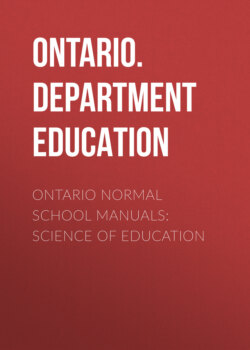Читать книгу Ontario Normal School Manuals: Science of Education - Ontario. Department of Education - Страница 39
На сайте Литреса книга снята с продажи.
THE INSTRUCTOR'S PROBLEMS
ОглавлениеTable of Contents
The end in any learning process being to set the pupils a problem which may stimulate them to gain such an efficient control of useful experience, or knowledge, we may note two important problems confronting the teacher as an instructor:
1. Problem of Matter.—The teacher must be so conversant with the subject-matter of the curriculum and with its value in relation to actual life, that he may select therefrom the problems and materials which will enable the child to come into possession of the desirable experiences. This constitutes the question of the subject-matter of education.
2. Problem of Method.—The teacher must further be conversant with the process by which the child gets command of experience or with the way in which the mind of the child, in reacting upon any subject-matter, selects and organizes his knowledge into new experience and puts the same into execution. In other words, the teacher must fully understand how to direct the child successfully through the four stages of the learning process.
(a) General Method.—In a scientific study of education it is usually assumed that the student-teacher has mastered academically the various subjects of the curriculum. In the professional school, therefore, the subject-matter of education is studied largely from the standpoint of method. In his study of method the student of education seeks first to master the details of the process of education outlined in the opening Chapters under the headings of problem, selecting process, relating process, and application. By this means the teacher comes to understand in greater detail how the mind of the child reacts upon the presented problems of the curriculum in gaining control over his experiences, or, in other words, how the process of learning actually takes place within the consciousness of the child. This sub-division is treated under the head of General Method.
(b) Special Methods.—In addition to General Method, the student-teacher must study each subject of the curriculum from the standpoint of its use in setting problems, or lessons, which shall enable the child to gain control of a richer experience. This sub-division is known as Special Methods, since it considers the particular problems involved in adapting the matter of each subject to the general purpose of the educative process.
3. Problem of Management.—From what has been seen in reference to the school as an institution organized for directing the education of the child, it is apparent that in addition to the immediate and direct control of the process of learning as involved in the method of instruction, there is the more indirect control of the process through the systematic organization and management of the school as a corporate institution. These more indirect problems connected with the control of education within the school will include, not only such topics as the organization and management of the pupils, but also the legal ways and means for providing these various educational instrumentalities. These indirect elements of control constitute a third phase of the problem of education, and their study is known as School Organization and Management.
4. An Historic Problem.—It has been noted that the corporate institution known as the school arose as the result of the principle of the division of labour, and thus took to itself duties previously performed under other less effective conditions. Thus the school presents on its organic side a history with which the teacher should be more or less familiar. On its historical side, therefore, education presents a fourth phase for study. This division of the subject is known as the History of Education.
